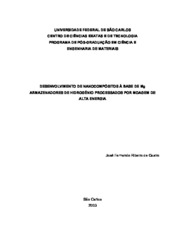Desenvolvimento de nanocompósitos à base de Mg armazenadores de hidrogênio processados por moagem de alta energia.
Abstract
In the present work, Mg based nanocomposites were developed in the following systems: Mg TM, MgH2 TM, MgH2 MgF2 e MgH2 TM MgF2
(where TM means transition metal). The nanocomposites were processed by high
energy ball milling and the obtained powders were characterized by in-situ X-ray
diffraction during heating, transmission and scanning electron microscopy and differential scanning calorimetry. The microstructural evolution during heating of the MgH2 + 5%at%Nb was monitored by in-situ X-ray diffraction. It was concluded that the NbH/MgH2 and Nb/MgH2 nanointerfaces play major role on the hydrogen
adsorption. These nanointerfaces act as fast diffusion paths or diffusion short circuits. The contribution of the thermodynamic attraction of these interfaces on hydrogen and its influence on sorption are also discussed. Both thermodynamic and kinetic effects accelerated the hydrogen desorption by the Mg-Nb composite.
Based on the above, a mechanism for hydrogen desorption by the Mg-Nb by the Mg-Nb nanocomposite was proposed. It was observed that MgF2 greatly improved the desorption kinetics of hydrogen in the MgH2-MgF2 nanocomposite, showing it catalytic effect. The best result concerning the hydrogen desorption kinetics was
for the [MgH2]90[MgF2]10 (wt %) nanocomposite. The on set desorption temperature of this nanocomposite was 253ºC. It was concluded that hydrogen diffuses through the MgH2/MgF2 nanointerfaces (fast diffusion paths). In this way, the hydrogen desorption kinetics was improved by the action of these nanointerfaces.
